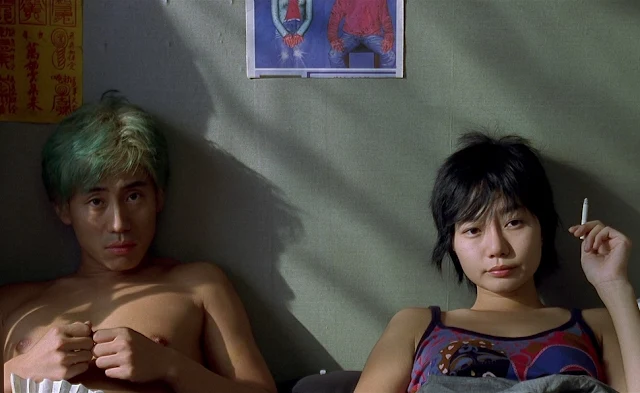 |
| Lee Sung-Jae and Doona Bae in Barking Dogs Never Bite |
After watching several films by Bong Joon-ho, I should know to expect the unexpected, but even his very first feature, Barking Dogs Never Bite, threw me for a loop. What to make of a film whose protagonist, an unemployed academic kept sleepless by the demands of his pregnant wife and a barking dog in his apartment building, captures what he thinks is the offending animal and, failing in his attempt to throw it off the roof or to hang it by its leash, shuts it into a cabinet, but after finding that it was the wrong dog, unable to bark because of a throat operation, returns to the basement to release it, only to find that it's being stewed and eaten by the janitor? Moreover, after this experience, he does find the barker and this time succeeds in throwing it off the roof. And eventually the janitor finds the carcass and eats it too. Would it be fair to say that a failure of tone if not taste has taken place? But tone is something, to judge by Bong's other films, the director thumbs his nose at. Suffice it to say that there's something to offend almost everyone in Barking Dogs Never Bite, which seems to delight in treating animal cruelty as a subject for comedy. The film actually begins with the proclamation that no animals were harmed in its production, which doesn't exactly get Bong off the hook for his depiction of animal abuse. But what it does is remind us that this is "only a movie," or that we should approach the film with the awareness that there's a reason it's going to shock or offend us. The reason, I think is that Bong wants us to question our reactions, to examine why our responses are the way they are. Does the death of the small animal flung from the roof offend us more or less than the death of its somewhat addled human owner? Barking Dogs Never Bite doesn't succeed in part because it meanders a bit into the lives of its ancillary characters, such as the young woman who accidentally witnesses the killing of the second dog and pursues the killer, filled with dreams of being celebrated as a hero on television when she captures him. And then there's the protagonist's attempt to raise enough money to bribe a dean into giving him a professorship. It often seems as if Bong had ideas for at least three movies that he tried to blend into one. Still, as an expression of an ironic vision by a gifted artist, the movie can't be dismissed simply as a failure. Rather, it's an astonishing feature film debut by a director who would find his footing soon enough.
